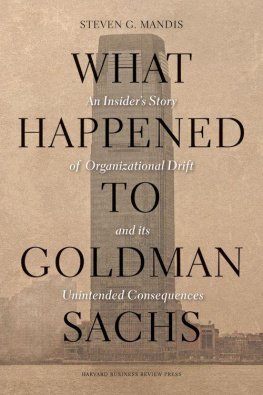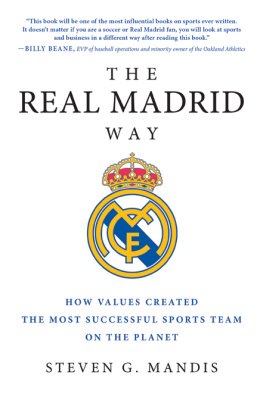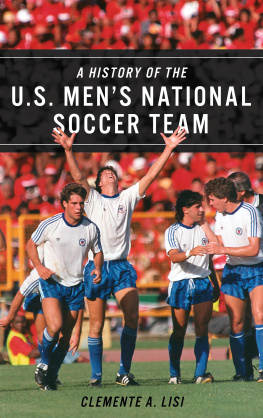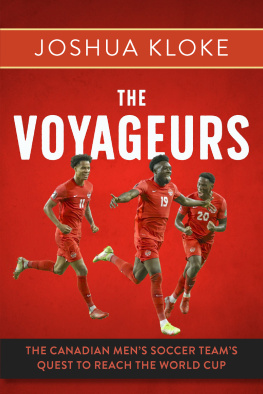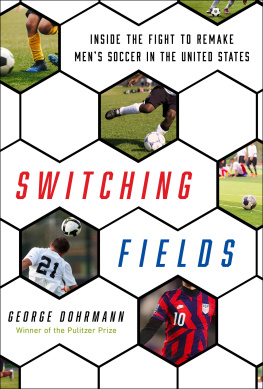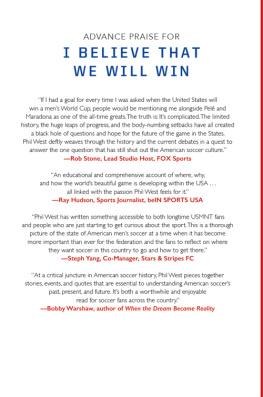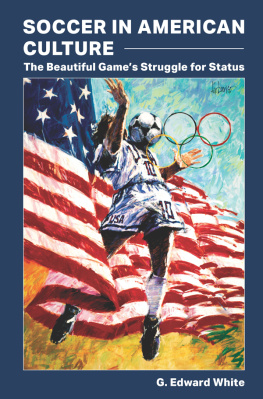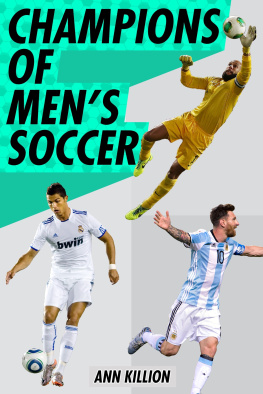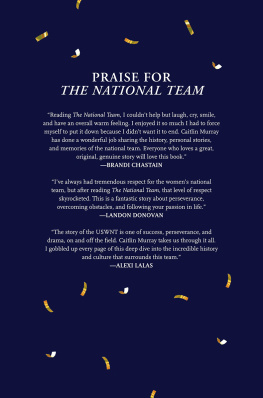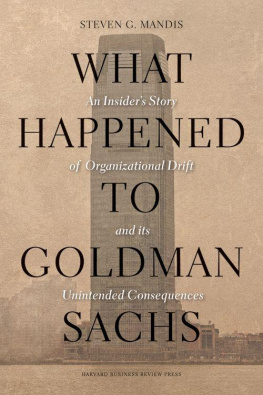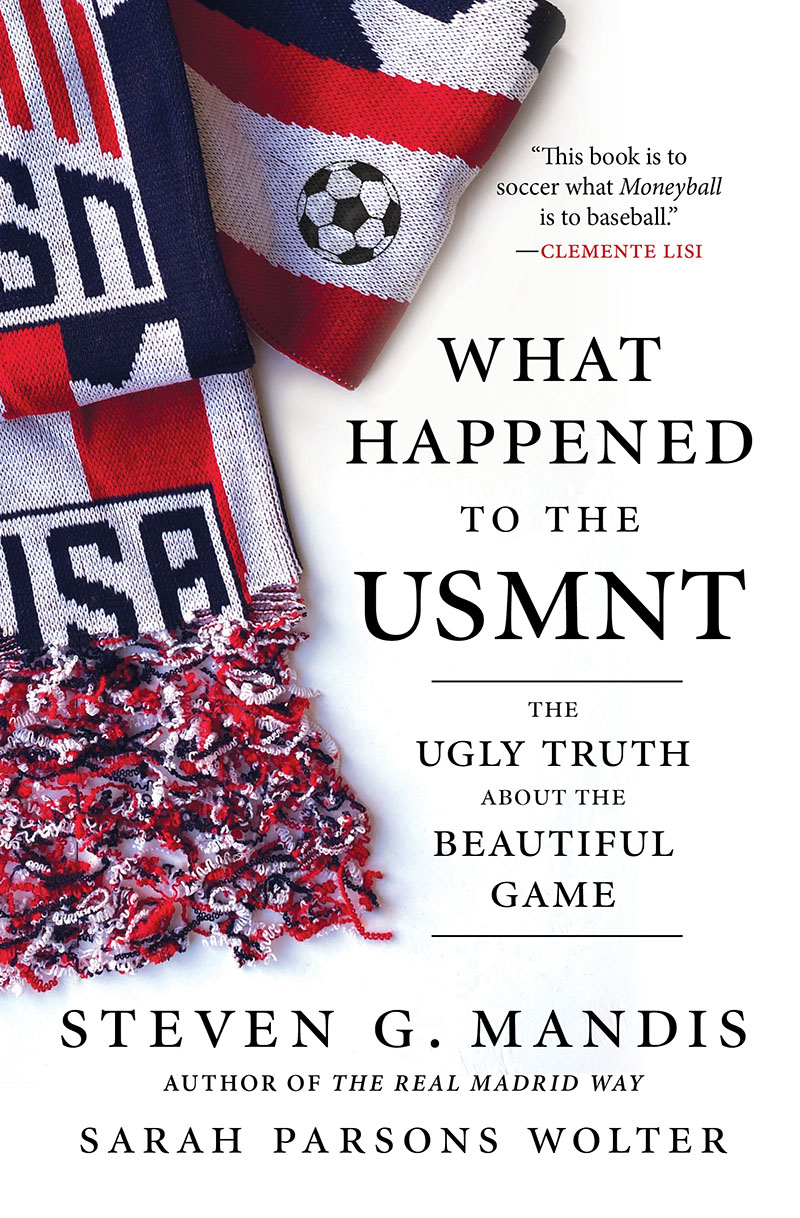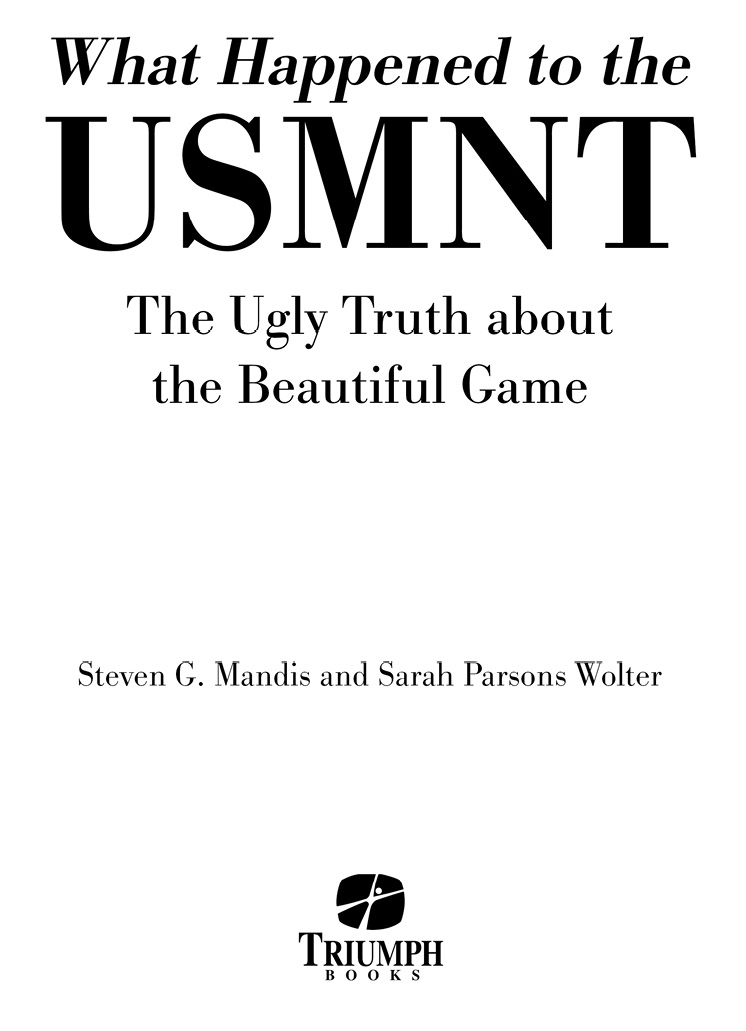
This book is dedicated to the former, current, and future members of the U.S. national mens and womens soccer teams
In recognition of you and our thanks, author proceeds from sales of this book are donated to charity
Contents
Preface
In 2004, after advancing out of the group stage, Greece beat France (with Zinedine Zidane and Thierry Henry) in the quarterfinals, the Czech Republic (with Pavel Nedvd and Petr ech) in the semifinals, and heavily favored Portugal (with Lus Figo and Cristiano Ronaldo) in Portugal in the Finals to win the 2004 UEFA European Championship. When Greece qualified for the tournament (the only other time they qualified was in 1980), their goal was to win a single gameafter all, the bookmakers had them at 801 odds to win the tournament. In a 2016 interview with Rory Smith of ESPN, Vasilis Tsiartas, a Greece midfielder during the tournament, said, Just one game. It was something none of the [Greece] national teams had been able to do [at a major tournament]. Even the [Greece] side who had gone to the World Cup in 1994 had not managed to beat anyone. That would have counted as a success: winning just once.
Actually, Greece didnt even score a goal in the 1994 World Cup, while allowing 10 goals in three group stage matches. Greeces left back Takis Fyssas added, We only had the weapons we had been given. We did not have a Zidaneor Cristiano Ronaldo. We only had hard work, sacrifice, determination, and that family spirit. What we did is the same as how Atltico Madrid play now.
Atltico Madrid reached the Champions League Final in 2014 and 2016 and are a perennial contender to win the tournament even though they dont have the budget and talent of many of their competitors. They are a club many of the favorites fear. Atltico Madrid have an identity centered around grinta (literally: grit)an extraordinary determination difficult to describe and find in players, a warrior mentality. Their players are willing to abandon caution and throw their heads where most players wouldnt extend their cleats. Their fans, players, and coach prioritize grinta even over resultsits their identity. After being criticized for their reliance on grit and a counter-attacking style combined with superb goalkeeping, defense, and set pieces, Atltico Madrids coach Diego Simeone responded, Everyone has their own style of play. You may like it or not, but football is beautiful because you can win in different ways.
And maybe that is an ugly truth about the beautiful game.
Introduction
In the 2002 FIFA World Cup jointly hosted by South Korea and Japan, the U.S. mens national soccer team (USMNT) had a memorable run. The USMNT beat Portugal 32 in the group stage. Portugal had three players nominated for the 2001 Ballon dOr, including Lus Figo, who finished sixth and played for Real Madrid. With the win, the USMNT advanced out of the group stage and defeated Mexico 20 in the Round of 16. In the quarterfinals, the USMNT lost to soccer power Germany 01. Germany had three players in the top 15 voting for the 2002 Ballon dOr, including goalkeeper Oliver Kahn, who finished third. Nearly the entire team played in the Bundesliga, the top German professional league.
The USMNT certainly were not outplayed by Germanythe USMNT had more time of possession, shots on goal, and shots on target. The match included a controversial no-call of a handball by a German defender on his goal line that prevented what would have been a match-tying USMNT goal. After a dismal performance at the 1998 World Cup, where they finished 32 nd out of 32 teams, the USMNT had shown they deserved to be on the world stage in 2002. With the crowd chanting USA! USA!, the players walked off the field in South Korea with their heads held high.
The USMNT didnt have any players even close to being nominated for the Ballon dOr. Most experts said that the players athleticism exceeded their technical ability. The USMNT utilized hard work, energy, hustle, speed, and teamwork. They took advantage of set pieces, luck, and opponents mistakes. The USMNT played counter-attacking soccer. If the Italians have their catenaccio , the Spanish their tiki-taka , the Dutch their totaalvoetball , the Germans their kampfgeist , and the Brazilians their ginga , then the American style was, for lack of a better word or phrase, Spirit of 76.
While extraordinary progress has been made in the last few decadesthe USMNT reached the Final of the 2009 FIFA Confederations Cup and advanced to the Round of 16 in the 2010 and 2014 World Cupsthe USMNT never seemed to fully live up to increasing expectations and the 2002 World Cup quarterfinal comparison.
In 2017, the USMNT failed to qualify for the 2018 World Cup. After several disappointing results, all the team needed to do to qualify was to defeat or tie Trinidad & Tobago (T&T), an opponent that had won only one of its previous nine matches. The USMNT lost 12.
When we looked up the starting lineups for the match, we were surprised. None of the T&T starters played in Major League Soccer (MLS). Most played in the TT Pro League, T&Ts top soccer division. Three starters played internationally, one in the highest Dutch professional league, one in the second-level Belgian professional league, and one in the third-level Mexican professional league. The USMNT had six starters who played in MLS, three in the Top Five Leagues in Europe (Englands Premier League, Spains La Liga, Germanys Bundesliga, Italys Serie A, and Frances Ligue 1), and two in Mexicos Liga MX.
In a passionate rant to ESPN SportsCenter anchor Max Bretos that went viral, Taylor Twellman, a retired USMNT player who works as a television analyst for ESPN, called the loss and failure to qualify a complete embarrassment. Most, if not all, of the players felt the same way, expressing their collective disappointment, sadness, and frustration after the match. Omar Gonzalez, who scored an unfortunate own goal at the 17-minute mark, said, Its the worst day of my career. I am extremely sad right now. What was supposed to be a celebration is nowI, I dont even know what to say. Its terrible. We let down an entire nation today.
A little more than two years after the Americans lost to T&T, the USMNT saw their 34-year, 17-match unbeaten streak against Canada come to an end, suffering a 02 defeat.
In an interview with ESPN host and reporter Sebastian Salazar, Taylor Twellman expressed that he was just real apathetic about the entire thing. Its almost like I have no emotion, which actually scares the living crap out of me.
What Happened to the U.S. Mens National Soccer Team?
When the USMNT qualified for the 1990 World Cup, their first qualification since 1950, they, the United States Soccer Federation (USSF), and most media members and fans had one common mission (the reason they were so passionate)to prove the legitimacy of soccer in the United States. The USMNTs goal was to qualify for the World Cup to prove they (and therefore soccer in the U.S.) belonged amongst the worlds best. The USSF, the USMNT, and most fans also wanted to prove that the U.S. legitimately deserved to host the 1994 World Cup, then build off that success to grow the sport of soccer in the U.S. The how also led to the playersthe who willing to sacrifice themselves and, with a common purpose, work together to prove U.S. Soccer legitimately belonged. While their style of play was counter-attacking, their identity was grit. We label the identity and style coming out of the 1994 World Cup as the Spirit of 76, embracing an underdog status or mentality similar to the American Patriots in 1776. Also, the USMNT seemed to be a group of loveable characters.


